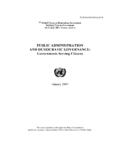Transcription of FORUM ON TAX ADMINISTRATION: SMALL/MEDIUM ... - …
1 ORGANISATION FOR ECONOMIC CO-OPERATION AND DEVELOPMENT FORUM ON TAX administration : SMALL/MEDIUM ENTERPRISE (SME) COMPLIANCE SUBGROUP Information Note Understanding and Influencing Taxpayers Compliance Behaviour November 2010 CENTRE FOR TAX POLICY AND administration Understanding and Influencing Taxpayers Compliance Behaviour 2 Table of contents 5 I 8 II Research on taxpayer compliance 11 Introduction on scientific research .. 11 Factors and drivers that influence taxpayer compliance 14 14 Practical implications and 16 20 Practical implications and 21 24 Practical implications and 24 Fairness and 27 Practical implications and 29 Economic factors.
2 31 Practical implications and 32 34 Practical implications and 35 III 38 40 Annex 1 Tax compliance behaviour: Summary of findings from revenue body 44 Figures 1 The compliance risk management 9 2 Internet search hits for tax compliance behaviour 13 3 Internet search hits for the different factors or drivers that influence tax compliance 13 4 Countries ratings of the perceived deterrence effects of audits, risk of detection and severity of 16 5 Countries ratings of the importance of social and personal 21 6 Countries ratings of the importance of opportunities/ 25 7 Countries ratings of the importance of trust (in the government, revenue body and others).. 29 8 Countries ratings of the importance of fairness (in the government, revenue body and others).
3 30 9 Countries ratings of the importance of economic factors .. 33 Understanding and Influencing Taxpayers Compliance Behaviour 3 Boxes 1 Deterrence NZ IRD research of recently audited 17 2 Deterrence UK HMRC s study of the preventive effects of random audit 18 3 Deterrence Mexico s SAT experiment with warning letters sent to selected 18 4 Norms Netherland s Tax Accounts 22 5 Norms - Spanish media campaign for reinforcing personal 22 6 Norms Canadian research 0n compliance 23 7 Norms Australian research concerning participation in the cash economy .. 24 8 Opportunities Sweden s use of information letters sent to selected taxpayers prior to the filing of tax 26 9 Opportunities UK HMRC s anthropological research on motivating 27 10 Fairness IRAS s survey of taxpayers perceptions concerning 30 11 Fairness Chile IRS research of taxpayers satisfaction with tax audit 30 12 Economic factors Norway s Fair Tax Evasion 33 13 Economic factors CRA research involving younger 33 14 Economic factors NZ IRD s research into the relevance of geographical 34 15 Interaction Netherlands research on attitudes and intentions to moonlighting 35 16 Interaction UK HMRC s study on customer views of the new penalties regime 36 17 Combined factors The CRA s campaign-related 36 18 Combined factors Danish research of
4 Participation in black economy 37 Tables 1 Extent and nature of revenue body tax compliance behaviour 45 2 Mean perceived importance of concepts and sub-concepts in explaining 46 Understanding and Influencing Taxpayers Compliance Behaviour 4 ABOUT THIS DOCUMENT Purpose This information note describes the findings from a survey to member countries and studies of scientific literature on taxpayer compliance behaviour. The purpose is to describe current knowledge on taxpayer compliance behaviour in order to assist countries in their effort to cost effectively influence taxpayer behaviour to improve compliance. Background to the FORUM on Tax administration The FORUM on Tax administration (FTA) was created by the Committee on Fiscal Affairs (CFA) in July 2002. Since then the FTA has grown to become a unique FORUM on tax administration for the heads of revenue bodies and their teams from OECD and selected non-OECD countries.
5 In 2009 participating countries developed the FTA vision setting out The FTA vision is to create a FORUM through which tax administrators can identify, discuss and influence relevant global trends and develop new ideas to enhance tax administration around the world. This vision is underpinned by the FTA s key aim which is improve taxpayer services and tax compliance by helping revenue bodies increase the efficiency, effectiveness and fairness of tax administration and reduce the costs of compliance. In carrying out this mandate, the FTA s work is directly supported by two specialist Sub-groups Compliance and Taxpayer Services that each carry out a program of work agreed by member countries, and a number of more focused task groups. The Compliance Sub-group s mandate, in broad terms, is to provide a FORUM for members to: periodically monitor & report on trends in compliance approaches, strategies & activities; consider & compare member compliance objectives, the strategies to achieve those objectives & the underlying behavioural compliance models and assumptions being used; consider & compare member compliance structures, systems and management, and staff skills and training; and develop and maintain papers describing good country practices as well as develop discussion papers on emerging trends and innovative approaches.
6 Since its inception, the Sub-group has focused its work on issues associated with improving the tax compliance of SME taxpayers. The Sub-group meets annually to review and discuss developments, to provide oversight and direction of its work program, and to provide a FORUM where members can exchange experiences and approaches for improving taxpayers compliance. Caveat National revenue bodies face a varied environment within which they administer their taxation system. Jurisdictions differ in respect of their policy and legislative environment and their administrative practices and culture. As such, a standard approach to tax administration may be neither practical nor desirable in a particular instance. The documents forming the OECD tax guidance series need to be interpreted with this in mind.
7 Care should always be taken when considering a country s practices to fully appreciate the complex factors that have shaped a particular approach. Inquiries and further information Inquiries concerning matters raised in this note should be directed to Sean Moriarty (Head, International Co-operation and Tax administration Division) at e-mail Understanding and Influencing Taxpayers Compliance Behaviour 5 Summary All revenue bodies share a common mandate. This mandate is to ensure a high level of compliance with the various tax laws and regulations in place within their jurisdiction. In order to ensure compliance, it is incumbent upon a revenue body to influence the compliance behaviour of its taxpayer population. Influencing taxpayer behaviour is not a new concept in tax administration as evidenced by the vast array of programs in place to assist taxpayers comply as well as to deter taxpayers from non-compliance.
8 However, what is relatively new is the extent of research being undertaken to better understand what motivates tax compliance. Better understanding of taxpayer behaviour can be expected to place revenue bodies in a stronger position to design and implement effective compliance strategies, which contributes to the sustainability of taxation systems. This information note contains an extensive review of compliance literature on the subject of influencing taxpayer behaviour as well as the results obtained from a questionnaire sent to revenue bodies participating in the FORUM s Compliance Sub-group. The findings of the note are presented under six main headings: (1) Deterrence; (2) Norms; (3) Opportunity; (4) Fairness and Trust; (5) Economic factors and (6) Interactions.
9 The key findings are as follows: Deterrence Deterrence resulting from audits, the risk of detection and/or severity of punishment is the primary response that comes to mind when the general public is asked about how a revenue body promotes compliance; however, studies demonstrate conflicting evidence as to whether deterrence strategies have the desired behavioural influence on compliant and non-compliant taxpayers some revenue bodies have reported that deterrence activities (large audit adjustments and monetary penalties) have actually emboldened taxpayers to behave more non-compliant in subsequent years. For the habitual non-complier, a deterrence strategy involving recurring audit activity may be required. The success of deterrence strategies is also linked to a taxpayer s norms.
10 Of particular interest is the finding that deterrence is more effective where strong social norms exist. Therefore, revenue bodies may wish to consider the use of non-monetary penalties that attach a social cost form of response to non-compliant behaviour. Research findings suggest that communication plays a critical role in how a deterrence strategy is perceived by taxpayers. It is not sufficient to simply deliver a message that non-compliant taxpayers are being detected; the public must also be reassured (truthfully) that most taxpayers are honest, as this promotes a strong social norm to remain compliant. Otherwise, deterrence communication can give the impression that non-compliance is the norm and thus running the risk of promoting further non-compliance.



















